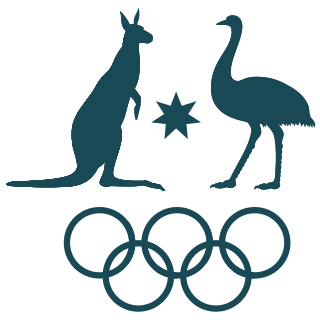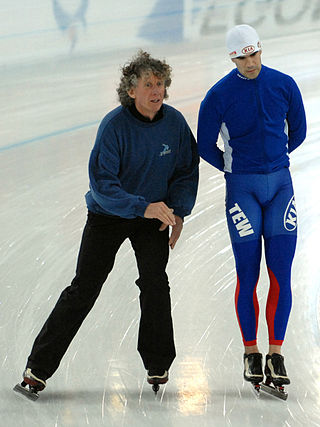Related Research Articles

The Winter Olympic Games, also known as the Winter Olympics, is a major international multi-sport event held once every four years for sports practiced on snow and ice. The first Winter Olympic Games, the 1924 Winter Olympics, were held in Chamonix, France. The modern Olympic Games were inspired by the ancient Olympic Games, which were held in Olympia, Greece, from 776 BCE to 394 CE. The Baron Pierre de Coubertin of France founded the International Olympic Committee (IOC) 1,500 years later in 1894, leading to the first modern Summer Olympic Games in Athens, Greece in 1896. The IOC is the governing body of the Olympic Movement, with the Olympic Charter defining its structure and authority. The original five Winter Olympic Sports were bobsleigh, curling, ice hockey, Nordic skiing, and skating. The Games were held every four years from 1924 to 1936, interrupted in 1940 and 1944 by World War II, and resumed in 1948. Until 1992, the Summer Olympic Games and the Winter Olympic Games were held in the same year. A decision to change this was made in 1986, when during the 91st International Olympic Committee session, IOC members decided to alternate the Summer Olympic Games and the Winter Olympic Games on separate four-year cycles in even-numbered years. Also, at that same congress it was decided that 1992 Winter Olympics would be the last to be held in the same year as the Summer Games and that to change the rotation, the games that would be held in 1996 would be brought forward by two years, being scheduled to 1994. After those games, the next were to be held in 1998 when the four-year Olympic Cycle resumed.

The 1964 Winter Olympics, officially known as the IX Olympic Winter Games and commonly known as Innsbruck 1964, were a winter multi-sport event which was celebrated in Innsbruck, Austria, from January 29 to February 9, 1964. The city was already an Olympic candidate, unsuccessfully bidding to host the 1960 Games. Innsbruck won the 1964 Games bid, defeating the cities of Calgary in Canada and Lahti in Finland. The sports venues, many of which were built for the Games, were located within a radius of 20 km (12 mi) around Innsbruck. The Games included 1,091 athletes from 36 nations, which was a record for the Winter Games at the time. Athletes participated in six sports and ten disciplines which bring together a total of thirty-four official events, seven more than the 1960 Winter Olympic Games. The luge made its debut on the Olympic program. Three Asian nations made their Winter Games debut: North Korea, India and Mongolia.
Steven John BradburyOAM is an Australian former short-track speed skater and four-time Olympian. He won the 1,000 m event at the 2002 Winter Olympics. He was the first athlete from Australia and also the first from the Southern Hemisphere to win a Winter Olympic gold medal, and he was also part of the short-track relay team that won Australia's first Winter Olympic medal, a bronze in 1994. The nature of his gold medal win - a relative veteran and rank outsider, he came through from last place in the final straight as the entire field ahead crashed out on the final corner - became iconic of underdog success and perseverance at the Olympic Games.

The Australian Olympic Committee (AOC) is the National Olympic Committee responsible for developing, promoting, and protecting the Olympic Movement in Australia. The AOC has the exclusive responsibility for the representation of Australia at the Olympic Games, the Youth Olympic Games and at Regional Games patronized by the International Olympic Committee (IOC). All National Olympic Committees are constituents of the International Olympic Committee.
Kirstie Claire Marshall is an Australian aerial skier and Victorian state politician.

Australia first competed in the Winter Olympic Games in 1936 in Garmisch-Partenkirchen, and has participated in every games since, with the exception of the 1948 Games in St. Moritz.

Australia competed at the 1988 Winter Olympics in Calgary, Alberta, Canada. Eighteen athletes participated, competing in alpine skiing, biathlon, cross-country skiing, figure skating, and speed skating, and for the first time bobsleigh. Australia's best result was tenth by Danny Kah in the 5000 metres speed skating.

Australia competed at the 1992 Winter Olympics in Albertville, France. 23 athletes competed, participating in alpine skiing, biathlon, bobsleigh, cross-country skiing, figure skating, freestyle skiing, luge, short track speed skating, and speed skating. Freestyle skiing and short-track speed skating were medal events for the first time, and Australia has competed in these events in every games since. Australia's best result at these games was seventh in the 5000 metres short-track relay.

Australia competed at the 1994 Winter Olympics in Lillehammer, Norway.

Colin Victor Coates, is a former ice speed skater from Australia, who represented his native country in a record six consecutive Winter Olympics, starting in 1968 in Grenoble, France.
Kieran Hansen is an Australian short track speed skater who competed in the 1992 Winter Olympics, in the 1994 Winter Olympics, and in the 1998 Winter Olympics.
Andrew Murtha is an Australian short track speed skater who competed in the 1992 Winter Olympics and in the 1994 Winter Olympics.
Richard Nizielski is an Australian short track speed skater who competed in the 1992 Winter Olympics, in the 1994 Winter Olympics, and in the 1998 Winter Olympics.
Gweneth Molony is an Australian figure skater. She is the 1949–1951 Australian national champion. She represented Australia at the 1952 Winter Olympics, where she placed 21st. She and Nancy Burley were the first ladies singles skaters to represent Australia at the Olympics. Molony also competed in pair skating; she is the 1949 Australian national champion with partner Adrian Swan. In 2020 at the IOC headquarters in Lausanne, she was recognised as Australia's first female Winter Olympian. She was presented with her Olympian certificate, and became the earliest Olympian to sign the athletes wall at the new IOC headquarters.
Joanne Henke is a former Australian alpine skier who represented Australia at the 1976 Winter Olympics. She is the daughter of former ice hockey player and Australian winter sports administrator Geoff Henke and 1952 figure skating Olympian Gweneth Molony.
Ian Andrew Chesterman is an Australian sports administrator serving as the current president of the Australian Olympic Committee (AOC), succeeding John Coates. He previously served as a vice president of the AOC, and the Chef de Mission of the Australian Team for the 2020 Tokyo Olympic Games.
John Kah is an Australian former short track speed skater, who represented Australia at the 1992 Winter Olympics in the relay team.
Robert George Chisholm was an Australian sports administrator. He was the manager of the Australian teams that competed at the 1952 and 1956 Winter Olympics.
The Olympic Winter Institute of Australia (OWIA) is an Olympic & federal government-funded elite sports training institution of Australia for the purpose of training athletes and coaches in sports involved in the Winter Olympics.

The Icehouse is an Australian ice sports and entertainment centre, located in the Docklands precinct of Melbourne, in Victoria, Australia.
References
- Andrews, Malcolm (2000). Australia at the Olympic Games. Australian Broadcasting Corporation. ISBN 0-7333-0884-8.
- Gordon, Harry (1994). Australia and the Olympic Games. University of Queensland. ISBN 0-7022-2627-0.
- Gordon, Harry (2003). The time of our lives: inside the Sydney Olympics : Australia and the Olympic Games 1994–2002. University of Queensland. ISBN 0-7022-3412-5.
- McAvaney, Bruce (1992). The Sportsworld Year 2. Text Publishing. ISBN 1-86372-010-3.
- The Compendium: Official Australian Olympic Statistics 1896–2002. Australian Olympic Committee. ISBN 0-7022-3425-7.